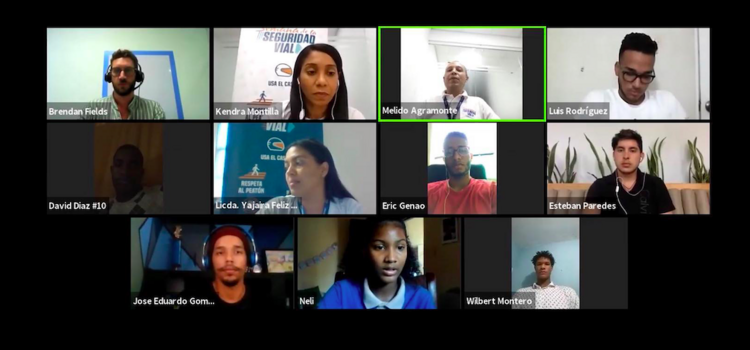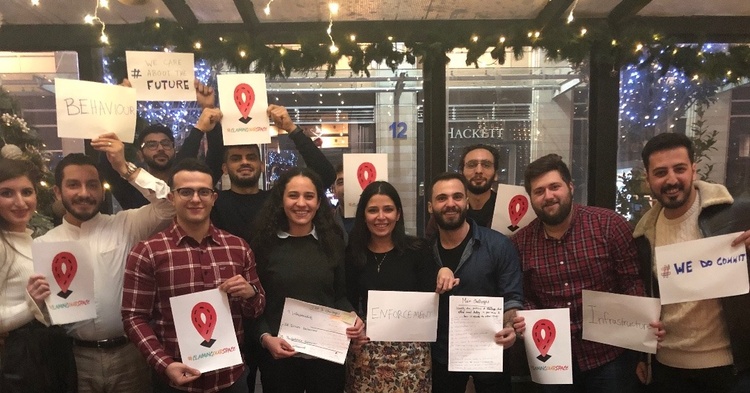
Driving a Global Agenda: Youth and Road Safety – A FIA High-Level Panel article
The FIA High-Level Panel (HLP) for Road Safety brings together leading advocates for road traffic injury prevention from the private and public sectors, with the aim of increasing political commitment and funding. In its most recent newsletter article, Jayathma Wickramanayake – United Nations Secretary-General’s Special Envoy on Youth, Ahmad Alhendawi – Secretary-General of the World Organization of the Scout Movement and our Executive Director, Floor Lieshout linked up to discuss youth and road safety issues: driving a global agenda.
We reproduce the article here.
Why is it important to involve youth on the topic of road safety?
Ms. Jayathma Wickramanayake:
We’ve all known that since the past decade, road crashes have been taking the lives of 1.35 million people every year, many of them are actually the lives of our young people.
Approximately, over 1,000 young people were dying every day because of road traffic crashes, which made road crashes one of the leading cause of death for young people aged 5-29.
As seen from the statistics, road safety is a topic that significantly affects the livelihood of young people in the world. Therefore, ensuring meaningful inclusion of youth in the policy process and decision-making are key to building sustainable road safety strategies that could truly protect the lives on the roads, be it at the local, regional, and global level.
Additionally, young people in all their diversity must be included in the dialogue to improve road safety. We need to acknowledge that youth don’t only identify by their age, young people also identify with intersectional identities. The voices of young people of color, young peoplewith disability, indigenous youth, LGBTQI youth, who often face more challenges in accessingpublic spaces and infrastructure, need to be represented in the road safety dialogue so that decision-makers can hear directly from youth about the unique challenges that they are facing on the road, often on the way to school, university, work, or merely on the way to meet their peers.
Mr. Ahmad Alhendawi:
Young people around the world have the ability to be powerful advocates and champions for causes that directly affect them. Road crashes are a leading cause of death and injury among youth, and if we are going to make progress in reducing the number of incidents globally, we need to involve young people in being part of the solution.
This means educating young people about the risks associated with driving under the influence of drugs or alcohol, or riding without a helmet or seatbelt. But it also means empowering young people with the knowledge and tools to make better decisions on the road and engaging them in the design of road safety solutions that can have a meaningful impact for society as a whole.
Mr. Floor Lieshout:
In addition to what has already been said, enshrined in the UN Convention on the Rights of the Child, young people have a right to be adequately informed, consulted and to be part of the decisions that impact their lives. This is particularly evident in Article 12. Youth have a right to fight the largest public health threat facing their lives and be part of the decision-making processes in road safety.
Youth are the main victims of road crashes and meaningfully involving them bene ts all parts of society. Through meaningful youth participation in road safety, we can empower young people to become the change agents of their communities. Who is better positioned to lead the charge for road safety from the grassroots up?
Involving youth in all phases of the process (ideation, development, implementation and evaluation), will lead to better decisions and better, more responsive policies that reflect the realities they face. It also promotes ownership, leadership and sustainability among young people themselves.
Finally, I would like to point out that there is a major difference in involving youth and ‘meaningfully’ involving youth. If we are serious about introducing meaningful youth participation in road safety on a large scale, we cannot cut corners. No more youth as decoration, or young people being manipulated for political agendas. Participating youth always need to be well informed, be taken seriously, brought to the table as equal players and have a real sense of ownership in the decisions that affect their life.
Have you noticed an evolution of the conception and involvement of youth from the international community?
Mr. Ahmad Alhendawi:
More and more young people are speaking out around issues that affect their health and well-being, and playing an active role in shaping the world around them.
The rise of youth-led movements and activist coalitions that give voice to the ideas, concerns and perspectives of young people is an encouraging trend globally. We see this every day in Scouting where
54 million girls and boys are acting as global citizens to improve the sustainability of their communities. These movements are powerful because they put pressure on our leaders and institutions to take action where it is needed most, whether that’s designing safer public transport systems, or enacting better road safety policies and regulations. They also give young people an opportunity to speak directly to other young people which can create transformative change and greater awareness about the urgent need to address global issues such as road safety.
Mr. Floor Lieshout :
We have seen some evolution already, but unfortunately, we still hear leaders ‘blaming’ youth for dying on the world’s roads. This is completely unacceptable because it leads to an ‘it is their own fault’ attitude and ‘we need to educate the youth’ approach, instead of taking responsibility and identifying what is wrong with the system. A system that should protect them. So the first step is to stop blaming and start protecting. To be successful in eliminating road deaths, policy-makers must commit to Safe System principles: humans make errors, including youth. Now let’s design and build a system that will protect youth from death and serious injuries when they do.
The good news is that a few governments have already approached us to work with them on a national Youth Empowerment Programme. We feel there is great momentum for the cause, and various leaders take this very seriously. We have gained a lot of moral support from the international community. From (inter)governmental organisation, large private sector companies and civil society. However, real change occurs when we see it in our streets. When it trickles down from high-level policy-making tables and the results are seen on the streets and neighbourhoods around us; where youth are safe to commute.
Unfortunately, meaningful youth participation is not specifcally mentioned in the Safe System approach. We believe it is the missing ingredient that will create a revolution. Ten years ago, young people were not as aware of the climate crisis as they are today (there is little chance of reaching our climate goals if we do not invest in safe and sustainable transport). Now we see millions of youth marching the streets for a healthier planet. That is leading to real change. Challenging the status quo. Making the leaders feel uncomfortable, so they must take action. Voting new leaders in, with more progressive ideas. That is the power of youth, a new generation claiming their space.
This is something we will be putting forward to the international community. Having meaningful youth participation in Safe System strategies by design, instead of bolting it on.
Ms. Jayathma Wickramanayake:
At the 2nd World Youth Assembly for Road Safety that took place in Sweden last February, young people from around the world united their voices to advocate against the threats of road traffic injuries. Too often, young people are framed as the problem when it comes to road safety, while in reality, the young people of the world have always had to deal with roads and infrastructure that are neither safe nor friendly for youth.
The outcome of the Global Youth Statement that was launched last February reflects the voices of over 1,500 young people who participated in the youth consultation process.
Through this, young people have demonstrated that they are not only looking to be involved as beneficiaries but as equal partners who are capable of creating tangible recommendations that should be taken into account.
Most importantly young people also showed that they are done waiting for the lack of action from decision-makers. As youth in the international community, they are ready to claim youth’s rightful space at the decision-making table and they are not coming with empty hands.
Young people are ready to co-create solutions and policy, now it’s time for the decision-makers to respond to this demand for meaningful youth engagement.
What are the developments after the 3rd Global Ministerial Conference on Road Safety (Stockholm 19-20 February 2020) ?
Mr. Floor Lieshout:
We cannot ignore that COVID-19 had a massive impact on the momentum that we gained in Stockholm. The reactions the young people received were overwhelmingly positive. Looking in the rear-view mirror, we must simply be thankful that the Ministerial Conference and the World Youth Assembly for Road Safety were able to happen before the world shut down and changed so drastically. After, we quickly assessed the situation and changed our plans where needed (safety first!). Less focusing on what we cannot do, but getting creative and quickly adapting to a new reality. Now we need to build back better.
The 3rd Global Ministerial Conference on Road Safety and World Youth Assembly acted as a catalyst to unite young, future leaders from across the world to engage with decision-makers on safe mobility issues and its connected SDGs. The youth demands are well documented in the Global Youth Statement for Road Safety.
From this catalyst emerged an empowered network of passionate youth, with a combined purpose to make the world’s roads safer for everyone. We are building a bridge between youth and decision-makers through intergenerational talks and also between different fields and expertise since the issues and solutions are often interconnected.
To facilitate and coordinate our action, we launched in July the Global Youth Coalition for Road Safety. At this stage, we are promoting the Coalition and its work: www.claimingourspace.org. We want to quickly grow, engage and equip every member of the coalition from across the world with the resources, knowledge and power to lead local action in their communities. Under our tagline: #claimingourspace, young change-agents will continue to make waves that will aim to make this the last generation facing an unsafe mobility system that kills youth on an unprecedented scale.
Furthermore, I am very excited about a new decade of action for road safety. And with the support of many, we will lead a powerful youth movement into the new decade full of action and together halve road deaths and serious injuries by 2030.
Ms. Jayathma Wickramanayake:
Following the Conference in Stockholm, we’ve seen that there is clear demand for better multi-stakeholder & cross-sectoral partnerships if we want to achieve our goals for road safety. The responsibility of road safety is a shared responsibility of both road users and infrastructure designers, and the only way to move forward is to collaborate.
Some of the important demands that came out of the Conference is the need for better commitment from the international community to share data, evidence, and best practices that could be reflected on a global vehicle safety standard, road laws and regulations, and also sustainable transport system. Collaboration to develop innovation and knowledge sharing could be the key to a road safety revolution.
Most importantly, through this Conference, the world also got to see the signi cant role of young people in road safety. Young people have voiced out our demand to take part in the decision-making process and we need the international community to carry the commitment to work with youth not only post- Conference but also beyond.
Mr. Ahmad Alhendawi:
The Ministerial Conference was a pivotal convening of leaders from around the world who are well positioned to adopt recommendations outlined in the “Stockholm Declaration” and make progress towards a new global target for road safety for 2030.
Pre-conference activities also created an important space for hundreds of youth advocates for road safety to come together and call on decision-makers to create the conditions for safer roads and safer mobility.
Since the event, young people have continued to champion the cause of road safety in their communities and online through advocacy e orts that aim to better enforce road safety laws, build more sustainable and accessible transport systems, improve education for safe driving, get unsafe vehicles o the road, and so much more.
Through this kind of youth advocacy and mobilisation, we can save lives and make even more progress towards tackling the global road safety crisis.
What messages would you like to convey to the HLP community?
Ms Jayathma Wickramanayake:
It is important for youth to be consulted and meaningfully engaged, not just at the implementation stage, but also from the beginning of the planning process in creating better public policy for all that could signi cantly improve the health and livelihood of people, including young people.
Mr. Ahmad Alhendawi:
Young people from around the world have de ned a clear agenda for action through the Global Youth Statement for Road Safety.
It is up to us as an international community, and as global youth movements, to ensure that the largest generation of young people in history is able to live up to their full potential.
Mr. Floor Lieshout:
The Global Youth Coalition for Road Safety is inspiring action by promoting youth engagement and participation in the global advocacy arena. We want to open new doors for young people to interact with decision-makers and make their voices loud and clear. The question is, will you join and support us? If you see an opportunity to support youth leadership, get in touch! We are waiting to collaborate.
 About the High-Level Panel for Road Safety
About the High-Level Panel for Road Safety
The panel brings together an unprecedented coalition of leaders from the global business community, international institutions and NGOs, with the primary objective to raise awareness and to raise funding for road safety actions, especially in low- and middle-income countries.
The Panel aims to act as a catalyst, working with all interested stakeholders, and has a particular focus on making a contribution towards increasing engagement within the private sector. Whilst governments play a critical role in creating policies that are the determinants of road safety, private companies including car manufacturers and the insurance industry also have a vested interest in the safe mobility of people.
The vision and concrete objectives of the Panel are reflected in the 10 point manifesto that was published when the Panel was launched in November 2015 in New York under the auspices of the UN Secretary General..



 Vial. Representatives from the USAID Project, Young Alert, National School of Education, and YOURS – Youth for Road Safety.
Vial. Representatives from the USAID Project, Young Alert, National School of Education, and YOURS – Youth for Road Safety.










